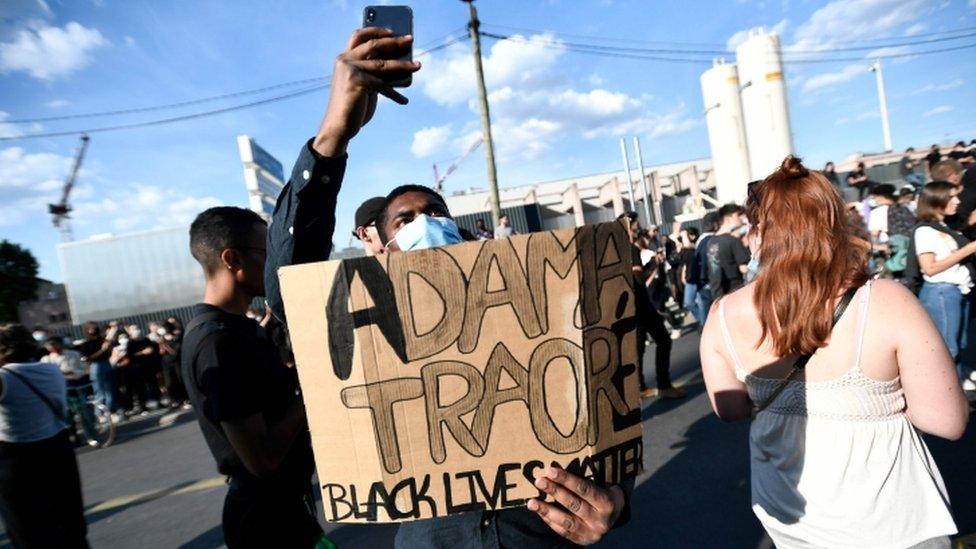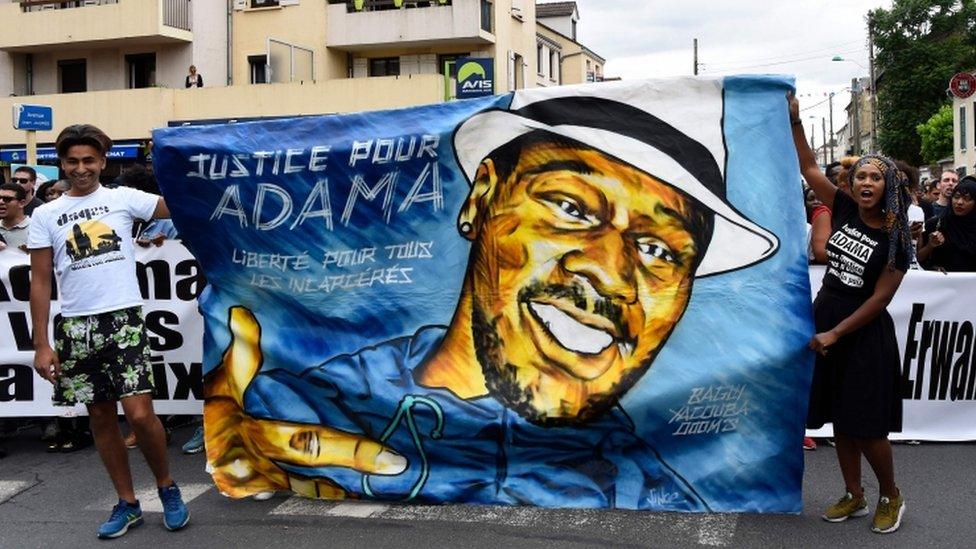Adama Traoré: French anti-racism protests defy police ban
- Published

Calls for justice for Adama Traoré, who died after being detained in 2016, have re-ignited in France
Thousands of people have taken part in protests in France over the 2016 death of a black man in police custody, defying police orders not to assemble due to coronavirus restrictions.
The death of Adama Traoré, 24, has been likened to the killing of George Floyd in the US, whose death has sparked protests across the country.
Police clashed with protesters in the Paris suburbs on Tuesday.
The Paris police chief has rejected charges of racism against his force.
About 20,000 people defied the order on mass gatherings to join the protest. Initially peaceful, the march turned violent, with stones thrown at police and tear gas fired back.
Some of the demonstrators carried Black Lives Matter placards - the movement that began in the US and has spread internationally.
There were also demonstrations in other cities, with thousands attending rallies in Marseille, Lyon and Lille.
Interior minister Christophe Castaner criticised the protests in a tweet. "Violence has no place in a democracy," he wrote, and he congratulated the police "for their control and composure".
Police union official Yves Lefebvre insisted the two cases were very different but he warned that France's inner-city banlieues (suburbs) were like a pressure-cooker, "ready to explode".
Who was Adama Traoré?
Traoré was stopped by police in July 2016 when out with his brother in the Paris suburb of Beaumont-sur-Oise.
The 24-year-old did not have his identity card on him, and ran as the police approached. Three Gendarmerie officers chased him down and detained him. Shortly after he died in their custody.

Adama Traoré's death in 2016sparked protests
One later told investigators he and his two colleagues had pinned down Mr Traoré using their bodyweight.
Following his death in 2016, violent protests were seen in Paris for several days.
His case has become a rallying cry against police brutality in France, which young ethnic minority communities say targets them.
Spike Lee on George Floyd's death and his new film Da 5 Bloods
Official reports indicate he died of heart failure, possibly due to an underlying health condition. Last Thursday, the officers who detained Mr Traoré were exonerated by a police investigation.
But another autopsy, requested by Traoré's family, reportedly suggests it was the police's actions that caused his death.
According to broadcaster Franceinfo, external, the independent report says he died of "positional asphyxia" caused by being placed in the prone position.
What happened on Tuesday?
On Tuesday campaigners defied authorities, after their request for permission to protest was denied by police.
Public gatherings are limited to 10 people to control the spread of coronavirus.
Video showed police firing tear gas at crowds in Paris, as well as several fires and blocked roads.
Allow X content?
This article contains content provided by X. We ask for your permission before anything is loaded, as they may be using cookies and other technologies. You may want to read X’s cookie policy, external and privacy policy, external before accepting. To view this content choose ‘accept and continue’.

"Today we are not just talking about the fight of the Traoré family. It is the fight for everyone. When we fight for George Floyd, we fight for Adama Traoré," his sister, Assa, told the protest, according to AFP.
Paris police chief Didier Lallement defended his force against allegations of brutality and racism.
In a letter to police officers, he said he sympathised with the "pain" they must feel "faced with accusations of violence and racism, repeated endlessly by social networks and certain activist groups".